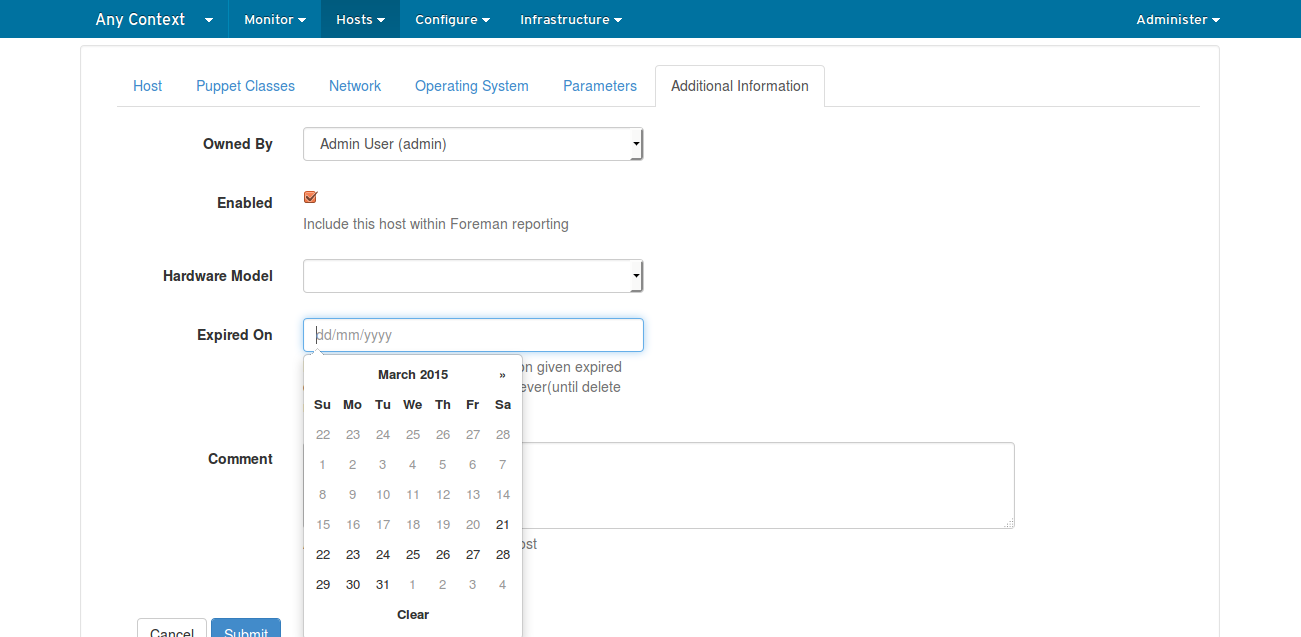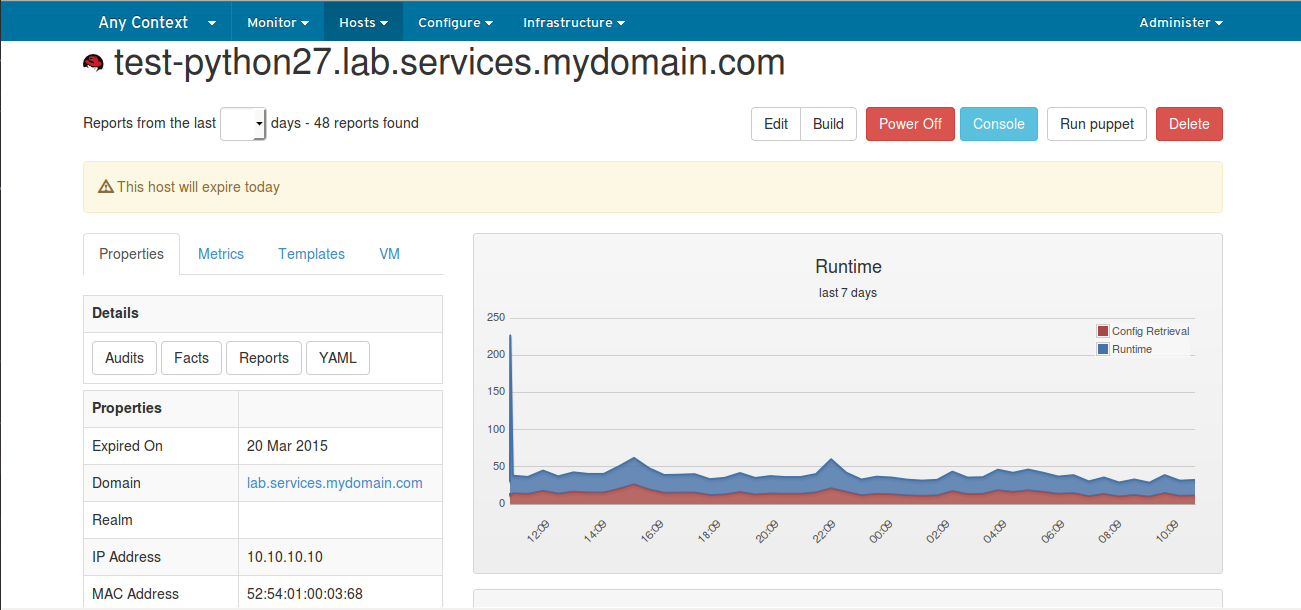Foreman makes host creation extremely simple for a sysadmin or a user. However this simplicity leads to wasteful usage of compute resources. The foreman_expire_hosts plugin allows to specify an expiry date for the host. The host will be shutdown first and then automatically deleted after a grace period.
This plugin adds an expired on (date) field to the host form (Additional Information tab). If we create a host with expiry date, then that host will be stopped on the day after the given date and then deleted. If a host has no expiration date set then that host will live forever (until it is deleted manually).
This plugin will send two warning notifications before host expiry (see Settings). It also sends notifications when the host is stopped on its expiry date and when the host is deleted after the grace period (configured in settings).
| Foreman Version | Plugin Version |
|---|---|
| >= 1.11 | ~> 2.0 |
| >= 1.13 | ~> 2.1 |
| >= 1.15 | ~> 3.0 |
| >= 1.16 | ~> 4.0 |
| >= 1.17 | ~> 5.0 |
| >= 1.18 | ~> 6.0 |
| >= 1.24 | ~> 7.0 |
| >= 3.0 | ~> 8.0 |
See Plugins install instructions for how to install Foreman plugins.
TLDR: You need to install the package tfm-rubygem-foreman_expire_hosts on RPM-based systems or use foreman-installer.
This plugin has not been packeged for Debian, yet.
This plugin needs additional column in hosts table. Please run migration with below command
VERSION=20150427101516 foreman-rake db:migrate:upIf you have not installed this plugin through os packages, add below line to crontab to take appropriate action on expiring/expired hosts and notify user about those hosts. This cronjob will run at 07:45 AM.
# /etc/cron.d/foreman_expire_hosts
SHELL=/bin/sh
PATH=/usr/local/sbin:/usr/local/bin:/sbin:/bin:/usr/sbin:/usr/bin
RAILS_ENV=production
FOREMAN_HOME=/usr/share/foreman
# Send out notifications about expired hosts
45 7 * * * foreman /usr/sbin/foreman-rake expired_hosts:deliver_notifications >>/var/log/foreman/expired_hosts.log 2>&1
If we want to remove this feature and remove the expired_on column from hosts table, please run below rake task and either remove this gem from the Gemfile or uninstall the os package.
VERSION=20150427101516 foreman-rake db:migrate:downThis plugin will add configurations to settings table and are editable from settings page
NOTE: After installing this plugin, please update administrator email in Foreman Web UI (More -> Settings -> General) with valid email. This can be used to send notifications when the plugin failed to deliver notifications to its owner.
Existing foreman host create/edit API can be used to add/update host's expiry date. For example
Create host with expiry date
# POST /api/hosts
{
"host": {
"name": "testhost11",
"environment_id": "334344675",
"domain_id": "22495316",
"ip": "10.0.0.20",
"mac": "52:53:00:1e:85:93",
"ptable_id": "980190962",
"medium_id": "980190962",
"architecture_id": "501905019",
"operatingsystem_id": "1073012828",
"puppet_proxy_id": "980190962",
"compute_resource_id": "980190962",
"root_pass": "xybxa6JUkz63w",
"location_id": "255093256",
"organization_id": "447626438",
"expired_on": "30/12/2014" # dd/mm/yyyy format
}
}curl command example
curl -u admin:changeme 'https://your-foreman-url.com/api/hosts' -d 'host[name]=testhost11&host[expired_on]=30/12/2014&......' -X POST
Update host expiry date
# POST /api/hosts/testhost11
{
"host": {
"expired_on": "30/12/2014" # dd/mm/yyyy format
}
}curl command example
curl -u admin:changeme 'https://your-foreman-url.com/api/hosts/testhost11' -d 'host[expired_on]=30/12/2014' -X PUTCopyright (c) 2016 The Foreman developers
This program is free software: you can redistribute it and/or modify it under the terms of the GNU General Public License as published by the Free Software Foundation, either version 3 of the License, or (at your option) any later version.
This program is distributed in the hope that it will be useful, but WITHOUT ANY WARRANTY; without even the implied warranty of MERCHANTABILITY or FITNESS FOR A PARTICULAR PURPOSE. See the GNU General Public License for more details.
You should have received a copy of the GNU General Public License along with this program. If not, see http://www.gnu.org/licenses/.


